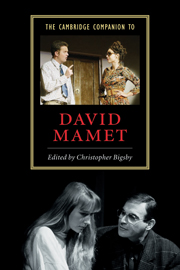Book contents
7 - Oleanna: language and power
Published online by Cambridge University Press: 28 May 2006
Summary
Both elusive and allusive, the title Oleanna is a good introduction to the play's linguistic strategies. It was so bewildering to the first audiences and critics that David Mamet added the epigraph from a folk song he had sung at camp to the published version:
Oh, to be in Oleanna,
That's where I would rather be.
Than be bound in Norway
And drag the chains of slavery.
Oleanna was a nineteenth-century utopian community founded by the Norwegian violinist Ole Bull and his wife Anna: thus “Oleanna.” This agricultural community failed because the land it had bought was rocky and infertile, and the settlers had to return to Norway. The application to the failed utopian dream of academia becomes evident as the play unfolds, as does the application of Mamet's second epigraph, from Samuel Butler's The Way of All Flesh, which suggests that children who have never known “a genial mental atmosphere” do not recognize its absence, and are easily prevented from finding it out, “or at any rate from attributing it to any other cause than their own sinfulness.”
- Type
- Chapter
- Information
- The Cambridge Companion to David Mamet , pp. 124 - 137Publisher: Cambridge University PressPrint publication year: 2004
- 6
- Cited by

